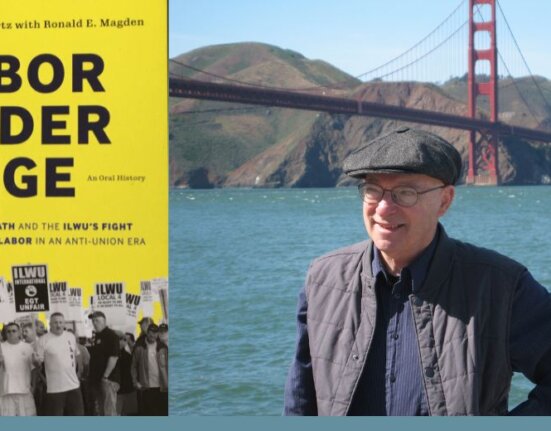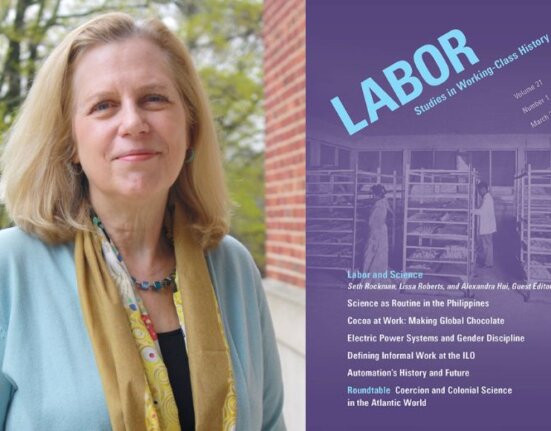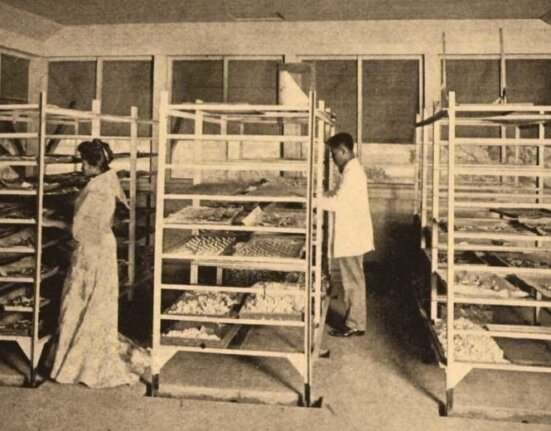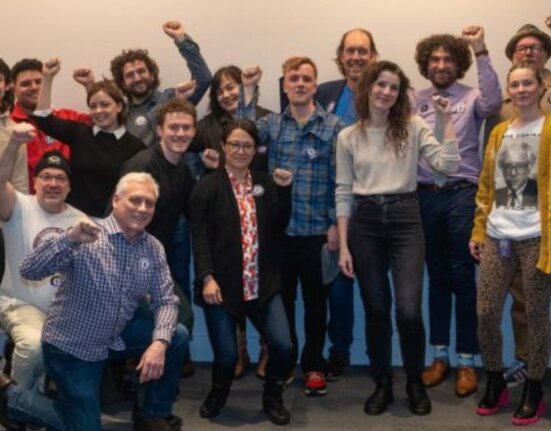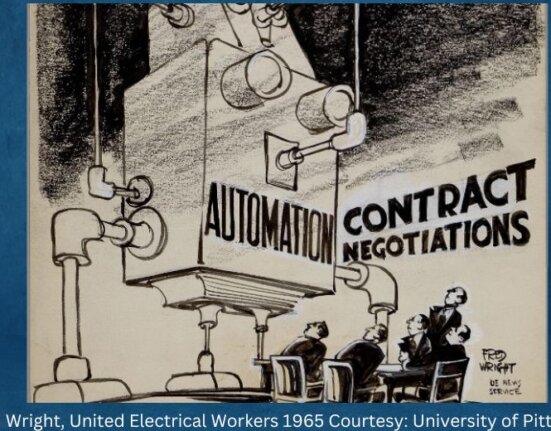“We’re All in this Together”
For the past forty years, Alice Kessler-Harris has been on the vanguard of labor history and of women’s and gender history. Last summer, I joined Tony Michels and Annie Polland in a wide-ranging conversation with Kessler-Harris about her life and work. She explained how growing up in a family of Hungarian-Jewish refugees in Wales shaped her identity and her values. We discussed her path to becoming a historian, and we learned how her participation in the women’s movement gave her a new vantage point on to labor history. In the course of our conversation, Kessler-Harris articulated some of the ideals that she brings to her teaching, her scholarship, and to mentoring a diverse group of students and making us all feel like we are part of her community.
The following excerpts are adapted from Tony Michels, Lara Vapnek, and Annie Polland, “An Interview with Alice Kessler-Harris,” Jewish Social Studies 24, no. 2 (2019): 82-105.
In this section of the interview, Kessler-Harris describes discovering the anarchist Emma Goldman while researching her dissertation on Jewish workers. Kessler-Harris explains how she began to read sources differently due to her participation in the women’s movement and she describes how the labor history community responded to her early scholarship. She mentions Anzia Yezierska, author of the 1925 novel, Bread Givers, which Kessler-Harris would become instrumental in republishing.
Kessler-Harris: …I’m reading all of this microfilm [at New York Public Library], and I come across Emma Goldman. It’s 1893 and she’s standing on a platform in Union Square and orating in Yiddish, saying, “If you want bread, go take it.” The newspaper headlines are replete with Goldman stories. And I think, oh, that’s interesting. I xerox her Union Square speech—at that point an expensive exercise—and then set it aside. I still have the photocopy. It’s somewhat faded and illegible. But at the time, I put it aside and didn’t think twice about it. I didn’t think it fit in my dissertation, which focused on Jews in the labor movement. Now I am embarrassed to note that I wasn’t clued in to women at all in that period. I had already read Anzia Yezierska at that point, but she didn’t seem to fit into the dissertation either, so I read her for the sheer pleasure of it.
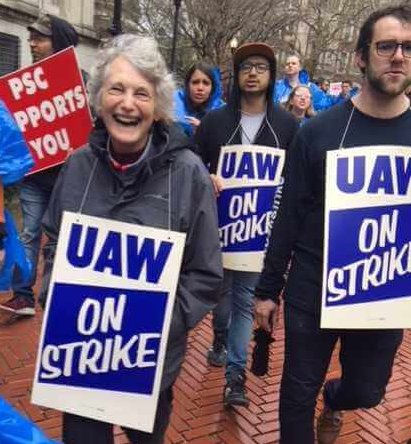
But after I defended the dissertation in 1968 things changed. There was a women’s movement all around me, my marriage was on the rocks; I joined a consciousness-raising group; and in 1970 I became a single parent. I lived then, as now, in New York City, where everything was happening, and I became part of the action. I discovered the newly organized Coordinating Committee for Women in the Historical Profession (CCWHP), which was then not about women’s history but about the situation of women in the profession. It was cofounded by Gerda Lerner, a pioneering historian of women, who would, after that, become a major influence in my life. It was then that I looked back at the dissertation and realized that I’d completely excluded women. I was already teaching, at Hofstra, by then, and dabbling in women’s history classes. It was a bit of a blow but I knew I couldn’t possibly publish the dissertation, or publish even an article from it, without going back and working on the women. It was the politics of the moment that sent me back to work on female labor organizers. I’d been working on Jewish labor, and when I began to look for women, of course, I found them. They were threaded through the late 1890s and early 1900s. My first published articles were about Jewish women labor organizers. I felt then that I had it all, I could focus on socialism, women, and Yiddish culture all bound together. I felt completely at home. I did not then and don’t now see women’s history and labor history as two different fields. For me there was a coherence in the set of issues and problems that made sense not just of women but of the period of the 1890s and the early 1900s.
Vapnek: Those early articles are wonderful, and they’re also very critical of the labor movement. Looking at those early organizers, you really called out the sexism in a way that I’m not sure anyone had done before. How did the rest of the labor-history community respond at that moment?
Kessler-Harris: There’s a full circle here, and it goes back to [Herb] Gutman. I started working on the women after I met Herb. He was interested in working-class culture, so he couldn’t not be interested in women, though he covered them up with language about the family. The turning point came when I delivered the paper that became “Organizing the Unorganizable: Three Jewish Women and Their Union” at a conference at Binghamton University in, I think it was 1973. I’ll never forget this conference. Gutman was in the audience. I think he probably put me on the program. Anyway, the audience included Gutman, Mel[vyn] Dubofsky, David Brody, and a couple of big-wig labor historians. As soon as I gave the paper, I was roundly attacked by Dubofsky, among others, who asked “Why are you doing this? What’s the point?” But Gutman stood up and in his hyperbolic way announced, “This is a very important paper because it gives us access into the minds of the people who are organized.” It was a paper for which I had mined Yiddish lullabies and folk songs, many of them sung by women. His defense silenced everybody. I don’t think it changed their minds, but it silenced them. Then Gutman suggested I send the paper to Labor History, which was then the only journal in the field. A version of the paper was published there. And then it was as if the world changed, because by then it was already 1975 or so. There was a women’s history movement and labor history was a substantial field. This piece seemed to bring the two together. It didn’t matter that it was critical of the labor movement. There was lots of criticism of the labor movement, around issues of race especially, and exclusionary qualities of trade unions. That piece seemed to open up a conversation.
In the following section, Kessler-Harris discusses her ideas of socialism and feminism and explains how she has applied them to her teaching and her mentorship.
Kessler-Harris: For me, socialism with a small s gets translated into what you might call menschlichkeit—in other words, the sense of sharing, cooperation, collectivity, solidarity, a world in which we’re all in this together. That is what I got from my childhood and my sense of what it was to be a real person. And for me, as I think for my father, that’s what Jewishness meant. I think that’s what it meant for Yezierska too. I think that was the main pull of the women’s movement for me. It wasn’t about equality per se with men. It was about joining a community or creating a community in which there were common values. Feminism was about achieving a community in which all women—I know now that sounds naïve—but it was a community in which women could share, could support each other and in so doing change the political environment so that women of all backgrounds could thrive.
For me, being on the left was completely consistent with being Jewish. Feminism changed, as you know, very dramatically. “Lean in” feminism is not my kind of feminism. I have a hard time with it, and I have a hard time with so-called compassionate conservatism that separates mothers and children. So there’s tension between and among how one imagines one’s politics and being on the left and being a Jew. But there’s also a fundamental link for me between the values of tikun ‘olam [repairing the world], of tsedakah [charity], of inviting the stranger in, and my sense of what we call democratic socialism. I try to infuse my teaching with these values. How do I support people, how do I help them through what they want to do? How do I help to create a world, a community in which individuals can move at their own pace in their own way? I think that’s what Judaism is about for me… I don’t see feminism as competitive. I do see capitalism as destructive of humane values. I think it’s the most individualized system and therefore the most prone to self-aggrandizement and greed. I see the instinct toward community and cooperation that I identify with socialism as a goal. I think that’s a goal for all of the politics that I’ve been involved in.


